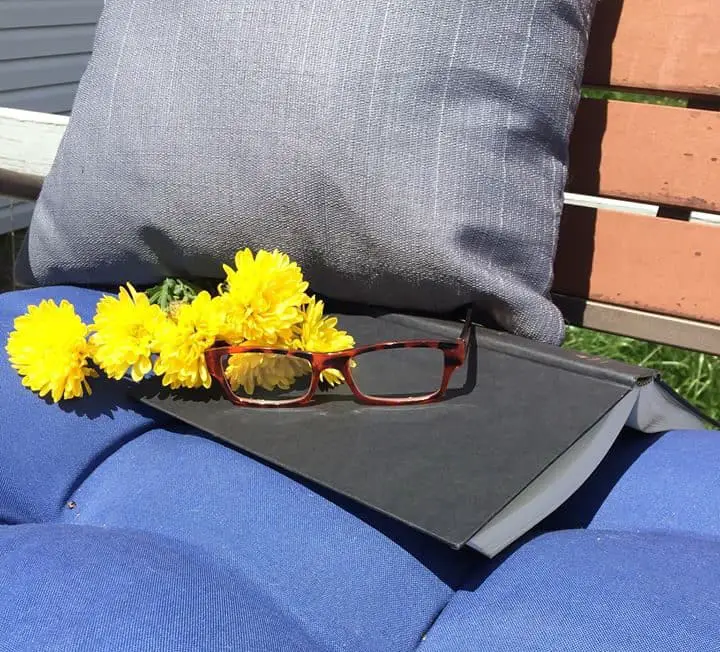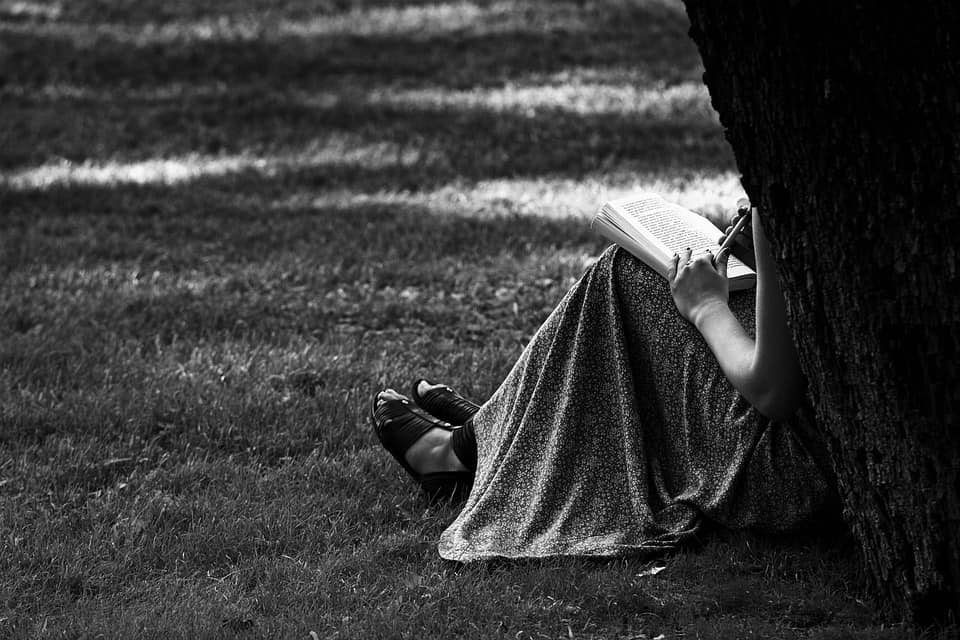
Let’s say you’re feeling depressed. What benefits of bibliotherapy could help? You could start sleeping better, increase your dopamine hits, improve your relationships and slow the effects of aging on your brain. You could learn a new hobby, change careers, improve your health and rediscover your hope.
All that from reading? You betcha!
Let me be clear. I’m referring bibliotherapy in it’s most general term. While doing research for this post, I found quite a bit on professional bibliotherapy as a treatment for anxiety, depression and other afflictions. It’s fascinating how trained therapists are using directed reading to improve people’s mental health.
What I’m talking about here is self-directed bibliotherapy, that is to say choosing your own books and reading to make life better.
There are many well-known benefits of reading. Reading lowers stress by reducing your heart rate and releasing muscle tension starting in as little as six minutes.
It’s well-known that reading expands your vocabulary, increases your knowledge and can help you have more empathy for others.
Toss in the advantages of taking a mini-vacation. Reading has a lot going for it.
But, there’s some benefits that might not be so obvious. Maybe even surprising.

Bibliotherapy Can Improve Relationships
Since reading is often a solitary activity and can serve as a moat to keep people away, it might surprise you to realize how many ways reading can improve your social life and relationships.
First of all, it will improve the relationships of the people you’re reading with. This is includes reading aloud to the kids and grandkids, the people in your book club or Bible Study group or a classmates that share a book reading experience.
Sarah Mackenzie talks about making meaningful and lasting connections with your kids through books.
When a group of people read the same books, they have shared memories. They can have discussions (if they want to) about their thoughts and feelings on the book.
If you read living authors, you have the chance to connect with the authors themselves or fellow fans. Super famous authors don’t have time to build friendships with all their fans. But, lots of authors are building their fan base or have an enormous capacity for human interaction. Virtually every author in the world is encouraged to hear how their work has made a positive impact on you, whether they have time to respond or not.
Reading also opens up the door bookish kindred spirits. The books that people love tell a lot about them.
Something I’ve loved the past few years is sharing books with my mom and dad. Their reading tastes overlap mine, and it’s been fun to introduce my favorite books that I think Dad will like and the ones that I think Mom will like. Sometimes I’m way off base. But, when I hit the target, it’s pretty fun. Becoming Mom and Dad’s Book Whisperer has been one of the best roles of my life.
Reading can also make you a better conversationalist and give you stories to tell. Your reading life can help you build the relational bridges to the people around you.
Bibliotherapy Can Increase Dopamine Hits From Learning
Dopamine is a feel good chemical that occurs naturally in the body, but there are ways to stimulate the production of dopamine. Learning new things is one way.
A study from UC Berkley showed that your brain receives dopamine hits when you learn new information. If you read to learn, your body will reward you chemically.
Learning new things can literally make you feel better. Who hasn’t had a eureka moment that got them excited? Why not put yourself in a position to learn on a regular basis?
Read to learn. It’s good for your happiness.

Bibliotherapy Can Combat the Effects of Aging on the Brain
Research shows that intellectual stimulation is a great way to diminish the effects or onset of Alzheimer’s. Doing puzzles helps the brain’s capacity. Following the storyline of a books and keeping track of characters helps. Even the mental stimulation of a good whodunit is exercise for the brain.
Reading and writing and other mentally stimulating activities can slow the decline of mental function as we age.
Professor and researcher Dr. Robert P. Friedland is quoted in a USA Today article, “Just as physical activity strengthens the heart, muscles and bones, intellectual activity strengthens the brain against disease.”
Even if you’re not close to feeling the effects of aging, a lifetime of mental stimulation is the best protection against mental decline. Start early. Build a lifetime practice of reading to learn and reading to entertain.
There’s so much that goes into good brain health but why leave out one of the most pleasurable? Read for your brain.
Bibliotherapy Can Lead to a Paradigm Shift
Reading opens up new avenues, new worlds, new ideas, new perspectives, new ways of looking at the world. It can totally mess with your values, attitudes and beliefs. That’s a good thing, or it can be a good thing.
Truth can handle scrutiny.
Reading can change the what you believe about yourself, God, people, and the world. It can challenge your current beliefs or strengthen them. It can open up a new avenue of belief.
Sometimes what we believe is illogical and irrational. No amount of reasoning will change our minds about what we cling to. We are often not receptive to another point of view. We are resistant to anything that challenges our current beliefs.
Other times, we’re searching. We’re looking for new answers, another perspective, a different world view. We’re open to the teachers and gurus who have something to give. At least, we’re open to certain ones. We’re willing to accept new information, a different point of view.
It’s times like these when the wisdom of the ages is at our disposal. All we have to do is go to the library. Do the research. Mine the lifework of the pioneers who came before us. Someone else has wrestled with the same demons. No need to reinvent the wheel.
We can go as far as they have and then one step further.
But, the point here is that we can enlarge our thinking, expand our understanding by reading. We can open ourselves up for a paradigm shift if we are willing. There’s no danger is studying anything with an open mind. Truth can survive scrutiny.

Bibliotherapy Can Reintroduce Hope
Memoirs and biographies can inspire us.
We are encouraged, that is to say, infused with courage by reading their stories. I remember when I was in difficult situations thinking that if Corrie Ten Boom could survive the concentration camp, I could survive, too. My situation was not nearly as bad as hers.
Even fiction can inspire. When we relate to a character, hero or person, we can vicariously feel their emotions and celebrate their victories with them. That gives us hope to face our foes, to climb our mountains and win our battles.
It’s possible to live without a lot of things, but hope is essential. Getting the inside story about people winning helps us believe we can win, too and the future will be better than the present. That there is a way out of the current dilemma, or dark pit or a way down off the mountain. Story is the key.
Sometimes reading can help you find your dreams again. It’s easy to lose them. Sometimes they need to be refashioned and refurbished. Sometimes you need to believe that it’s okay to start dreaming again.
Bibliotherapy Can Pave the Way for a Career Change
One huge advantage of the days we live in is the ability to pivot professionally, or even change career paths completely.
The crossroads in life are often a good time to transition into a new career. There’s lots of ways to get information about the field you’re interested in, but reading is one of the best.
Every field has it’s experts and gurus, the mentors who are willing to take on new disciples and will share their knowledge and experience. Reading their body of work is a great way to immerse yourself in a new field.
Reading someone’s else’s journey helps you avoid pitfalls and find shortcuts. Absorbing the knowledge of those on the cutting edge helps you become ready to blaze the trail when you exhaust all of the known entities.
There will always come a time when you reach the end of current knowledge and understanding. Then it’s your turn to make the mistakes, gain the experience and pass on the conclusions to those who come behind.

Bibliotherapy Can Help You Start a New Hobby
A great advantage of being an adult is that you can choose to learn whatever you want. No one is picking out the course of study and the books you should be reading. You can follow your interests, passions and curiosity wherever they lead.
There’s something to be said for doing things for the pure joy of them. Not for money, not for evaluation, but for pure enjoyment.
What are you interested in? What are you curious about? What creative outlet entices you? Would you like to garden? Sew? Learn a musical instrument or new language? How about music or painting? Restoring old furniture or re-decorating your house?
A great way to jump into a new hobby is to research it and stack up a pile of books on the subject. Some areas change and develop so fast that printed books can’t keep up. Fortunately, there’s many ways to consume information on quickly changing fields on the internet and through ebooks.
One hobby in particular is a natural outgrowth to reading: writing. There are many types of writing and so many ways to develop that hobby. But, one thing for sure: reading a lot will help you become a better writer.
Printed books from traditional publishers have the advantage of good editing. What you’re reading there will be at a higher standard. That will influence your own output. Correct grammar will sound right. A wealth of vocabulary will be at your fingertips. You can absorb great writing just by having it swirling around in your head.
Bibliotherapy Can Improve Your Physical Heatlh
Reading might not be the first thing you think of when you set out to improve your health. Diet and exercise might come to mind first. But our bodies are marvelously complex. There’s so much to learn about the building blocks to health, especially if you’re dealing with specific issues.
Sometimes you start with symptoms and pain. Reading can help you diagnose the problems.
I suffered with migraines that robbed me of a couple of days almost every month. It’s been a long journey to discover root causes. I owe a debt to my sister, a medical professional, for pointing me in the right direction and knowing which tests to order.
After discovering I had Hashimoto’s Thyroiditis, I looked around a bit before I stumbled on Izabella Wentz’ work on the internet and got a couple of her books. They helped me understand so much about how the thyroid worked and what was wrong and how that caused the symptoms. Best of all, they outlined changes I could make in my diet– foods to avoid, foods to add, as well as vitamin and mineral supplements that help.
After you have a good diagnosis, dig into some good resources to solve your problem. It might not be the first expert or guru you come across. You might have to search a while before you find someone who lines up with your philosophy and whose approach you agree with.
You might even have to try a few different approaches before you find one that works for you. Finding out what doesn’t work is still a step forward, just like Thomas Edison and all the ways NOT to make a light bulb.
A problem solved will make the effort worthwhile.

Bibliotherapy Can Contribute to Better Sleep
Sometimes the hardest part about getting to sleep is shutting down the brain from it’s swirling. Anything you can do to focus your mind on one thing helps you drift off. Reading does it admirably.
When the tasks of the day are done, or you’ve run out of time and energy to do more, reading is a great way to prepare the body for sleep. Besides slowing the heart rate and reducing muscle tension, reading can focus your mind long enough to shut down the brain swirling to help you get drowsy and go to sleep.
“‘I can’t shut my mind off’ is one of the most common phrases I hear from the patients that come to my sleep clinic,” says Chris Winter, medical director of the Martha Jefferson Hospital Sleep Medicine Center
In a Huffington Post article, he suggests creating a before bedtime routine with sleep-promoting activities like reading a book.
The best part of before bedtime reading is you can consciously choose what you’re going to think about. You can turn off the worry, regret or shame that will pound you and keep you awake. You can choose to read something uplifting that will encourage and inspire. You can choose to read something compelling– a story that will suck you in.You can even choose your mood.
Bibliotherapy Can Improve Your Mental Health
William Nicholson said, “We read to know we’re not alone.” There’s something encouraging about knowing that others have survived what you’re going through. They know how you feel. They found hope and persevered.
One way to combat depression is to regain perspective. A great way to step back and get a panoramic view of your problems is to crawl into someone else’s skin. See life through their eyes. Realize how much you have to be thankful for and the real size of your problems. See where you fit in to the timeline of world history. Our lives are just a blink. The things we worry and stress about often are not worth the mental energy we spend on them.
Reading about someone else’s reality puts our problems into perspective. Seeing them overcome problems gives us hope.
Negative thinking is an easy pit to slide into. When you choose to read uplifting books you choose to think uplifting thoughts.
A more directive way your reading can improve your mental health is to read self-help books related to whatever issue you wrestle with currently.
David McCullough said, “you read nonfiction to learn the truth about history. You read literature to learn the truth about human nature.”

The Next Step
Are you convinced yet? The benefits of bibliotherapy are legion. Time to jump in to some great books.
But where to start? I’ve curated a few book lists that you might like.
How about 8 Novels to Rekindle your Love for Reading? How about Fascinating Novels Inspired by the Lives of Real People?
Where are you going to find those books you love? I wrote about that.
What if you just don’t have time to read? Wrote about that, too.
There’s just no good reason you can’t be reaping all the benefits of bibliotherapy. Why not take the advantage to ramp up your reading life? Jump in!


